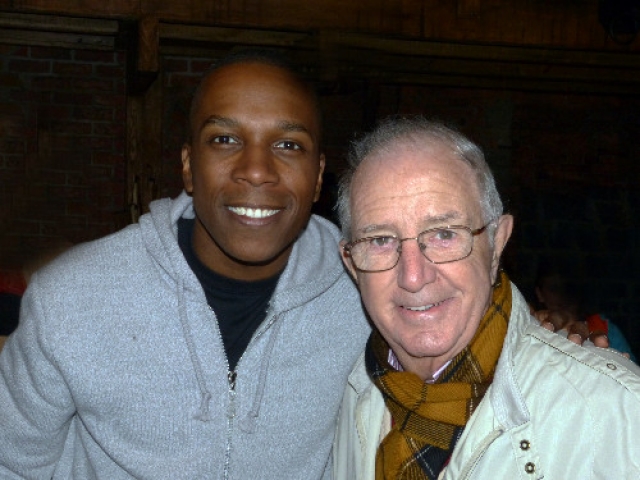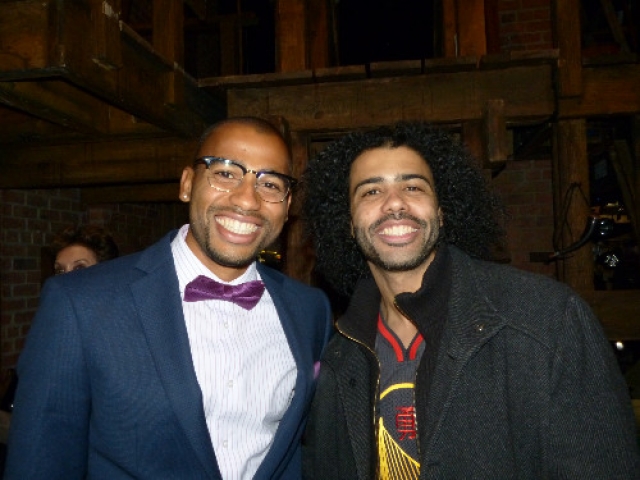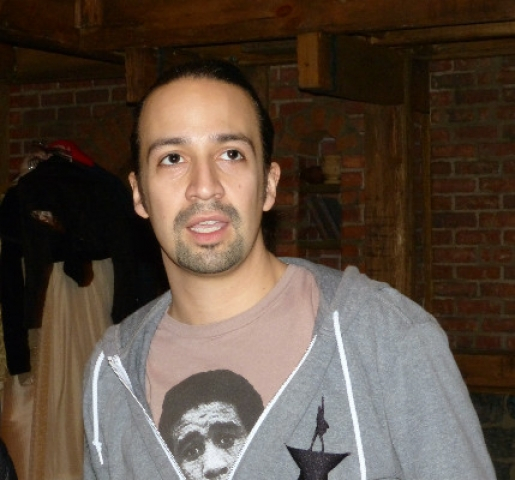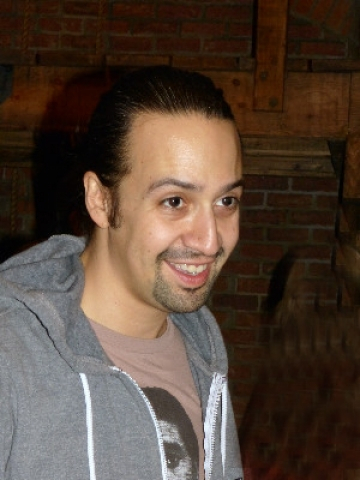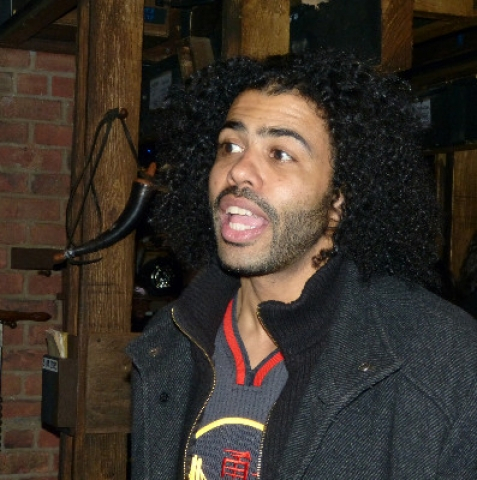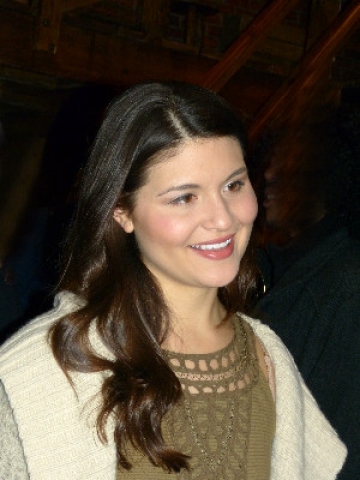What's Next for Hamilton Winners
From Broadway Sensation to Years on the Road
By: Charles Giuliano - Jun 14, 2016
Primarily driven by interest in the mega-hit Hamilton the viewership soared for the annual Tony Awards.
The broadcast drew 8.73 million viewers, up 35 percent from last year, according to preliminary ratings from the Nielsen Co. It is the largest audience for the show since 2001.
James Corden, host of CBS' "The Late Late Show" managed to define a fine line between a night of celebration and the sorrow that has gripped the nation following the slaughter of gays in a nightclub in Florida.
During the broadcast Corden and winners including Lin Manuel Miranda, for Hamilton, and Frank Langella for The Father, took their moment of celebration to read a sonnet and remarks noting grieving and solidarity with victims and their loved ones.
With 16 nominations it was a night of theatre history as Hamilton fell one short of topping the record number of wins set by The Producers.
For once the special sketches and riffs for an awards show worked with charisma, originality, wit and charm. For those not capable of staying up late enough for Corden’s comedy show it is likely that many will set their DVRs to catch his act.
Corden, a British comedian who has conquered American audiences, is himself a Tony winner.
One of his bits was to show several nominees who are famous for their roles on Law and Order.The hilarious clips included two of Hamilton’s three acting winners Leslie Odom, Jr. and Daveed Diggs. In one episode they appeared together.
While played for laughs the bit underscored the struggles to establish a career in acting.
In accepting an award for best featured actor in a play Reed Birney, a performer past mid career, stated that for the first several decades he struggled. But that the last several have been great. The candor was both amusing, considering a night of triumph, as well as poignant.
It is an all to vivid reminder of the odds against making it for actors with roles on TV shows with relatively short runs or guest spots on popular shows like Law and Order.
Earning a Tony for a mega hit like Hamilton has about the same odds as winning the lottery.
Back in November it was an issue we raised in the small, cramped dressing room of Odom taking a break between afternoon and evening performances of Hamilton.
We were in town for a meeting of American Theatre Critics Association.
Our California correspondent, Jack Lyons, is a friend of the mother of Odom’s actress wife Nicolle.
Through considerable effort he was able to secure several affordable tickets with terrific orchestra seats for the matinee. On the open market those tickets start at about $1,500 each.
In addition to that coup Jack also arranged for some of us to go back stage and meet briefly with Odom. It came down to Jack, myself, and ATCA president Bill Hirschman.
There was a mad scene in front of the theatre as fans thronged to catch a glimpse of the actors. There are weekly lotteries for a handful of cheap seats and the producers have worked to accommodate school groups.
We found ourselves on stage as Miranda interacted with visitors. Waiting at the stage door I had gotten friendly with Diggs’s brother. I asked if I could get a shot of them together.
As Odom picked at some takeout food we took turns asking questions. He was graceful and thoughtful.
Since it was still fairly early in the Hamilton phenomenon I was a bit out of turn asking him about what’s next.
The show transferred from Off Broadway last summer. We learned that the leading players were signed to one year contracts. Whatever they are being paid it is likely to be a fraction of what they are worth now that the show has become a phenomenon.
In the coming season several satellite productions will be staged and down the line it is likely to be produced by regional theatres.
Miranda has already announced that he is leaving the show this summer. As of now there has been no announcement of plans for Odom, Diggs and Renee Elise Goldsberry who won for best featured actress in a musical.
There are likely options to continue on Broadway with renegotiated contracts. It is also possible that having won Tony awards producers will consider them for starring roles on Broadway as well as film and television.
That entails some risk taking. It is unlikely that they will be able to replicate the serendipity of Hamilton. For all involved, including Miranda, it has been a once in a lifetime phenomenon.
Telling the story of the founding fathers in rap was a creation of magic and genius. It is so unique and game changing that it may be beyond repetition. Any attempt to repeat the genre will cause inevitable comparisons.
It is important to point out however, that Miranda won four Tonys, including Best Musical for In The Heights in 2008.
If Miranda, who is widely viewed as a genius, can win twice odds are producers will be willing to back him for a third Broadway show. Perhaps, yet again, he will prove that three’s a charm.
In the meantime, with cast changes and numerous productions, Hamilton will be on Broadway as well as on the road for the coming decade and more.
Thanks to my pal Jack we got to see the real thing baby.
Interview with Leslie Odom, Jr.
Charles Giuliano Can we talk about the evolution of hip-hop from a music of the streets to its incarnation as high culture in Hamilton. It is fascinating that vernacular music is the vehicle for telling such a complex story of one of the most talented and tragic of the nation’s founding fathers. The are many dimensions at play in this musical.
Leslie Odom There are people like Lin who have devoted their lives to hip-hop. They love it with everything they have. People like that are always interested in seeing how far it can go. They challenge how many boundaries it can cross and how supple it is. They explore how alive and shape shifting it can be. Hip-hop came on the scene in the late 1970s in an official way. So it’s still a young art form. We are only now beginning to see what it is capable of.
CG Were you into it before this show? Were you a hip-hopper?
LO I wasn’t a rapper before this show. I’m not a rapper now. There’s a connotation, a definition, official or not, that when you say you’re a rapper that means that you write. The genre is really about authenticity. My way into the show, there is a bit of intimidation, because I do not write my own lines. So how was I going to come at this? What is it that people are responding to in hip-hop? I think it’s about authenticity. It doesn’t matter if you’re from the suburbs of Detroit, or the streets of Detroit in its inner city, it just matters that you are telling a story that is truthful. That’s what the audience cares about. In this show it was about finding the truth for me. That’s what an audience responds to and what hip-hop is about.
Listen, it’s also pop culture. There are a lot of rappers telling stories but it has to be about the appearance of authenticity.
William Hirschman Lin has managed to merge it with very traditional Broadway tropes and ways of doing things. It’s an amazing synthesis of different types of music and then different stagecraft and discipline that you guys spend years learning.
LO That’s exactly right.
WH How does it feel when you’re doing that? Do people come back and say ‘that’s Broadway, that’s theatre?’
LO They do. Lin is only a year older than I am so we have grown up with this music. I was born in New York in ’81. Lin was born in ’80 so this music has been with us since the cradle. It’s the first time for me but the second time for Lin. He did it with In the Heights as well. It is liberating to tell a story that is this grand and patriotic for the first time with my music. With the voice of my generation. It’s a real mark on the timeline. That’s why we have so much passion for it on stage.
(After productions in Connecticut (2005) and Off-Broadway (2007), In the Heights opened on Broadway in March 2008. It was nominated for thirteen Tony Awards, winning four: Best Musical, Best Original Score, Best Choreography (Andy Blankenbuehler), and Best Orchestrations ( Alex Lacamoire and Bill Sherman). It won a Grammy Award for Best Musical Show Album. It was also nominated for the 2009 Pulitzer Prize for Drama.)
Jack Lyons Boy that comes through.
LO It does. He gave it to us and it feels like the first musical of our generation.
WH What hit me over and over was the resonance and relevance. If I were a twenty-year-old and someone got me in here I would think, this isn’t 1789, I’m living this. These people are going through the same things that I am. Do you guys get back any of that?
LO Oh yeah. That was my response at first as well. This is not about them this is about us.
JL You’ve got a two platform deal. You did an interview with Charlie Rose. My daughter sent a link and told me to watch it before seeing the show. You commented on having a bit of an edge during auditions. You participated in a read through was it? I tried to see Nikki’s show (Odom’s actress wife) but it is too early in the production. It’s called An Invisible Thread.
(Invisible Thread, formerly known as Witness Uganda, is a musical with a book, music, and lyrics by Matt Gould and Griffin Matthews. Based around the true story of Matthews' humanitarian trips to Uganda, and his work to fund his Uganda Project. The musical, in its current form, made its world premiere February 4, 2014 at American Repertory Theater. It will open soon at Second Stage Theatre in New York.)
LO Diane Paulus is directing.
CG I am interested in African American culture as America’s most unique and greatest contribution to the arts. Going back to the beginnings, with ragtime, the composer Scott Joplin wrote an opera called Treemonisha (1911). Fast forward to Duke Ellington experimenting with symphonic forms, then the suites of Mingus or collaborations between Miles Davis and Gil Evans. Connecting the dots I see a continuum now in Miranda composing a hip-hop musical. With no spoken dialogue it is indeed an opera in form. So there is a direct line of evolution from jazz to hip-hop.
LO The principles of jazz have a lot to do with hip-hop. By definition jazz means improvisation. Musicians don’t play the same thing twice. The hip-hop movement is about freestyling. It’s about speaking off the dome, from your heart, in the moment. So they’re related a lot in that way. Lin comes from that tradition.
CG Does that happen in this show?
LO No. Not in this show.
CG Are there differences from night to night?
LO Of course that’s always true in theatre depending on audiences. Lin is so well versed in the hip-hop tradition that it came out of him in a well formed way. At least the first draft is a freestyle. It’s just pouring out of him in a way that he’s not judging it. There has been so little rewriting for this show. Less than any other show I’ve worked with. There have been 20,000 little changes but when we would get a song in its first draft it was perfect. It’s crazy. He internalized all the information, everything he read so when it came through him it was truly inspired and damned near perfect.
CG So something will come out of this. Another iteration and another generation.
LO Wouldn’t that be nice.
WH How did you get involved?
LO I get an e mail from Lin. I was part of a reading about two and a half years ago. My wife Nicolette was doing a reading at Vassar. I went up to see her. There was also another reading and I sat in the last row of a black box theatre. I said, what am I seeing? It was just so fresh, vital, energetic and smart.
I never thought I would be part of it and then I got that e mail.
WH Did he know you?
LO Casually. Through the business.
JL Show business is all about referrals.
CG Can you talk about Hamilton as a new paradigm that’s changing theatre?
LO Do you believe that?
CG How can you not after seeing it.
LO My experience inside it is very different than to watch it. I say that because I don’t have the perspective that you guys have. What’s important to me is that the recipe doesn’t change. I’m learning this because people come to something and they respond to it. The response is great and wonderful. But you can’t get carried away by that on the stage. The thing you guys are responding to was the thing that we were doing before it was a success. There’s a diligence that has to stay on the thing we were doing at the Public and before anyone heard about it.
JL How long were you at the Public?
LO Four months. We were doing readings of this thing before it was Hamilton. It was just a bunch of people coming together and doing something with some honesty.
WH That’s the thing to hold onto that integrity.
LO You have to do that. If you change that it changes everything.
CG What happens to you later?
LO I don’t know. We’ll talk after that.
CG You have a one year contract so what happens the next day?
LO I have no idea.
JL Your trajectory is like a missile launch, straight up. They have done an article on you and Nikki as one of the eight power couples. You are Broadway royalty. How do you respond to that?
WH How do you stay real?
JL There are a lot of demands on your time. I know that from trying to arrange this. Everyone wants a piece of you.
LO I’m learning as I go. I’ve been in the business for awhile. I made my professional debut at 17 on Broadway.
CG What was the show?
LO Rent.
CG Not a bad beginning.
LO Along the way there’s impatience. When is it going to happen for me? I so grateful now that I am 34. I may be 35. (laughs) You just hope that you’re ready. That the lessons of life have fashioned you into the kind of person you need to be. I feel bad for the people it happens to before they have maturity. It just takes time with all the disappointments and heartbreaks. The successes along the way. It’s all that up and down stuff that allows you to appreciate a moment like this. That allows you not to be carried away. You see people treated poorly along the way and say that I would never do it like that. All those lessons are coming in handy now.
CG You just finished a matinee and are taking a break, which we are interrupting, before an evening performance. With eight or so performances each week how do you find the energy to keep it fresh?
LO I don’t expect another Hamilton will come along ever. If you get one in your career you’re divinely blessed. It helps to have material you believe in so strongly. That helps. I grew up in the church so what happens on stage is connected to the ministry in a way. I try to keep the intention as pure as possible. I like nice things and people wanting me to sign autographs as much as anybody. What happens on that stage is that there is a message that we are there to deliver. To people in need we are conduits of something larger than ourselves. So it’s closely related to ministry for me. It helps to have a story that you believe in and a way that story is being told. Every night there’s 1,300 people out there who have never seen it. For those people we may never be together in that way again.
WH You guys keep it sharp which is interesting. What we are seeing this week is catchup. So we started with American in Paris. They have been running since before the Tonys last year. There were as sharp and energetic, I’ll betcha, as they were a month in. I turned to my wife and said ‘That’s professionalism.’ We’ve been to shows where you can tell the energy level is down.
JL Oh sure. We don’t want you phoning it in. We want you in the moment. You could see it in the eyes the way you were looking at us. Everyone is in the moment. I was watching the company and the intricate moves of the choreography. Everything was just wonderful.
LO Unlike a lot of shows at the end of this show we take a company bow. Iin is the only one who gets his own. Which is nice but because the chorus and ensemble are necessary; they are fantastic in the telling of this story.
CG If you read the Hamilton bio the casting is not surprising.
LO He being born in Nevis (British West Indies).
CG He was likely of mixed heritage. In the book it is conveyed that there was outrageous political slander and his ethnicity was a part of the attacks by Jefferson and his circle.
LO Of course. It was in the musical but it got cut. There was a line that said (pause) I can’t remember but it was an allusion to the octoroon thing. “I hear he was an octoroon” something like that.
CG It also slips by quickly in the musical that Hamilton mourns the death of a officer and colleague who wanted to create a black regiment and given them freedom for their service after the war. Hamilton shared that view but nothing came of it. That just flew by but if you watch and listen carefully there is a lot of embedded history.
LO Oh yeah.
CG How does that project into your performance?
LO (Pauses thinking) People use the term color blind casting and this is actually the opposite of that. Color blind casting matters and changes the resonance of a piece.
This is what I look forward to seeing. The first Burr that I saw during that reading at Vassar was Indian.
CG American Indian?
LO No, East Indian an American actor. He was wonderful and changed the resonance. He was the only thing I had to compare it (Burr) to when I became involved. I was only the second actor to do it and obviously I’m black. I can’t wait to see even more of a mixup of different races on stage.
CG Will that happen?
LO Oh yes, of course. In the character breakdowns in the script it just says “non white” “non white” “non white” except of course for the king (George III). It’s really about America today telling this story. To see an East Indian actor doing the role, interesting is such a lame word, it was so wonderful because I spend a lot of time, obviously, thinking about being a black man, what it’s like being an African American actor, the opportunities, and if you’re an Indian American there’s even less. There’s less of your story being told. If you’re a brilliant Indian American actor there’s fucking nothing for you to do. (rising emphasis) There’s no material.
So now to have a show that’s so well written and so well built gives a place for all these wonderful, disenfranchised, brilliant actors to be as wonderful as they can be. As brilliant as they can be.
CG How is this changing audiences? This is the bridge/ tunnel audience coming to NY and Broadway. The expectation is for entertainment not enlightenment. They are paying through the nose to be looking at that stage and seeing a rainbow of performers telling the history of the founding fathers. What are they coming away with?
LO Two things. Number one what you’re going to have, every decade or so, you need a show like this to give a shot in the arm to the next generation of theatre goers. This is going to connect with young audiences in a way that will make them theater goers for the rest of their lives. If you consider kids from 8 to 18 who have never been interested in theatre, now you have theatre supporters who are going to support theatre for the next fifty years.
CG But young people of color can’t afford to come.
LO Yes but that’s like fashion or anything else. What you pay for right away with Broadway shows is the newness of it. In the first year audiences are playing because it’s new. If you don’t want to wait you pay out the nose. But eventually prices come down.
WH And you go on the road.
LO Of course. You may not afford to wear the latest trends right away but you can wait a year or two and it’s OK.
JL In terms of color blind casting do you see yourself playing any role at all regardless?
LO I do and as I get older, I do and I don’t, what I’m not interested in is erasing our culture. Any of our cultures. That’s what makes us who we are. It’s not about becoming devoid of race or culture so we’re all this one thing. It’s our difference which make us special.
When we get an Asian American actor in this show, when we have a Latin American Burr, that should change the flavor, that turns it on its head.
JL That doesn’t change it totally. It just turns the needle up. That’s the way that theatre evolves.
CG This summer at Shakespeare & Company John Douglas Thompson starred in Red Velvet a play about an African American actor who was the first to perform Othello on a London stage. It ended abruptly with racists reviews. As John told me it was Ira Aldrich who made possible his career as a classical actor. He said that he and others come out of that breakthrough. So there is a history and trajectory of people who have made this possible.
LO As people in theatre we are so aware of people in the tradition that we come from. We are so aware of this art form in a way that film and television are not. Perhaps one day but theatre goes back father than those genres.
CG In film Paul Robeson did The Emperor Jones (1933) and there was the all black musical Cabin in the Sky (1943). So it did happen in Hollywood in an admittedly more limited way.
LO (Pointing to a playbill pinned to the wall of his dressing room.) I got my Guys and Dolls (1950) playbill. This is the same stage as where that started. Some of the most brilliant performers of our time, black, white or otherwise, have come through this stage. As an actor of color, someone who at one time wasn’t even allowed to perform the roles that were written like Othello, you weren’t even allowed to do the shows which were about people like yourself. To finally get moments to be a part of this, to share in a wonderful profession and industry. It’s a gift to all of us.
I used to say that affirmative action doesn’t just help me. It helps my classmates as well because they get a more diverse education. It’s not all going to work. But we have to try.


